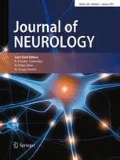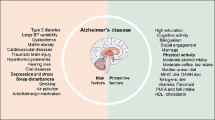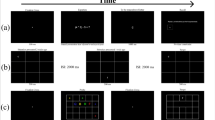Abstract
Background
Amnestic Mild Cognitive Impairment (MCI) is a condition with an increased risk for developing Alzheimer's disease (AD). Presently, gender differences are neglected in the assessment of MCI and AD.
Methods
We examined verbal and visuospatial episodic memory in 143 subjects diagnosed as healthy controls (HC; N = 48, Mini-Mental State Examination (MMSE) 29.2 ± 1.0 (mean ± standard deviation)), MCI (N = 43,MMSE 28.5 ± 1.4), and AD (N = 49, MMSE 25.1 ± 2.2).
Findings
Female HC and MCI subjects performed better on verbal episodic memory tasks than males. In contrast, visuospatial episodic memory was better in male than female AD patients.
Conclusions
We interpret the results in light of a genderspecific cognitive reserve and conclude that the gender-specificity of neuropsychological performance needs to be accounted for in clinical diagnosis of Alzheimer’s disease.
Similar content being viewed by others
References
Aartsen MJ, Martin M, Zimprich D (2004) Gender differences in level and change in cognitive functioning. Results from the Longitudinal Aging Study Amsterdam. Gerontology 50:35–38
Bachman DL, Wolf PA, Linn R, Knoefel JE, Cobb J, Belanger A, D'Agostino RB, White LR (1992) Prevalence of dementia and probable senile dementia of the Alzheimer type in the Framingham Study. Neurology 42:115–119
Backman L, Small BJ, Fratiglioni L (2001) Stability of the preclinical episodic memory deficit in Alzheimer's disease. Brain 124:96–102
Barnes LL, Wilson RS, Schneider JA, Bienias JL, Evans DA, Bennett DA (2003) Gender, cognitive decline, and risk of AD in older persons. Neurology 60:1777–1781
Barrett-Connor E, Kritz-Silverstein D (1999) Gender differences in cognitive function with age: the Rancho Bernardo study. J Am Geriatr Soc 47:159–164
Bayles KA, Azuma T, Cruz RF, Tomoeda CK, Wood JA, Montgomery EBJ (1999) Gender differences in language of Alzheimer disease patients revisited. Alzheimer Dis Assoc Disord 13:138–146
Beinhoff U, Hilbert V, Bittner D, Gron G, Riepe MW (2005) Screening for Cognitive Impairment: A Triage for Outpatient Care. Dement Geriatr Cogn Disord 20:278–285
Bleecker ML, Bolla-Wilson K, Agnew J, Meyers DA (1988) Age-related sex differences in verbal memory. J Clin Psychol 44:403–411
Brookmeyer R, Gray S, Kawas C (1998) Projections of Alzheimer's disease in the United States and the public health impact of delaying disease onset. Am J Public Health 88:1337–1342
Buckwalter JG, Rizzo AA, McCleary R, Shankle R, Dick M, Henderson VW (1996) Gender comparisons of cognitive performances among vascular dementia, Alzheimer disease, and older adults without dementia. Arch Neurol 53:436–439
Burns A, Zaudig M (2002) Mild cognitive impairment in older people. Lancet 360:1963–1965
Buschke H, Kuslansky G, Katz M, Stewart WF, Sliwinski MJ, Eckholdt HM, Lipton RB (1999) Screening for dementia with the memory impairment screen. Neurology 52:231–238
Folstein MF, Folstein SE, McHugh PR (1975) "Mini-mental state". A practical method for grading the cognitive state of patients for the clinician. J Psychiatr Res 12:189–198
Gron G, Bittner D, Schmitz B, Wunderlich AP, Riepe MW (2002) Subjective memory complaints: Objective neural markers in patients with Alzheimer's disease and major depressive disorder. Ann Neurol 51:491–498
Gron G, Bittner D, Schmitz B, Wunderlich AP, Tomczak R, Riepe MW (2003) Variability in memory performance in aged healthy individuals: an fMRI study. Neurobiol Aging 24:453–462
Gron G, Wunderlich AP, Spitzer M, Tomczak R, Riepe MW (2000) Brain activation during human navigation: gender-different neural networks as substrate of performance. Nat Neurosci 3:404–408
Hebert LE, Wilson RS, Gilley DW, Beckett LA, Scherr PA, Bennett DA, Evans DA (2000) Decline of language among women and men with Alzheimer's disease. J Gerontol B Psychol Sci Soc Sci 55:354–360
Henderson VW (1997) The epidemiology of estrogen replacement therapy and Alzheimer's disease. Neurology 48:S27–S35
Henderson VW, Buckwalter JG (1994) Cognitive deficits of men and women with Alzheimer's disease. Neurology 44:90–96
Herlitz A, Airaksinen E, Nordstrom E (1999) Sex differences in episodic memory: the impact of verbal and visuospatial ability. Neuropsychology 13:590–597
Herlitz A, Nilsson LG, Backman L (1997) Gender differences in episodic memory. Mem Cognit 25:801–811
Howlett DR, Richardson JC, Austin A, Parsons AA, Bate ST, Davies DC, Gonzalez MI (2004) Cognitive correlates of Abeta deposition in male and female mice bearing amyloid precursor protein and presenilin-1 mutant transgenes. Brain Res 1017:130–136
Kramer JH, Yaffe K, Lengenfelder J, Delis DC (2003) Age and gender interactions on verbal memory performance. J Int Neuropsychol Soc 9:97–102
Launer LJ, Andersen K, Dewey ME, Letenneur L, Ott A, Amaducci LA, Brayne C, Copeland JR, Dartigues JF, Kragh-Sorensen P, Lobo A, Martinez- Lage JM, Stijnen T, Hofman A (1999) Rates and risk factors for dementia and Alzheimer's disease: results from EURODEM pooled analyses. EURODEM Incidence Research Group and Work Groups. European Studies of Dementia. Neurology 52:78–84
Le Carret N, Auriacombe S, Letenneur L, Bergua V, Dartigues JF, Fabrigoule C (2005) Influence of education on the pattern of cognitive deterioration in AD patients: the cognitive reserve hypothesis. Brain Cogn 57:120–126
Lewin C, Wolgers G, Herlitz A (2001) Sex differences favoring women in verbal but not in visuospatial episodic memory. Neuropsychology 15:165–173
Maitland SB, Herlitz A, Nyberg L, Backman L, Nilsson LG (2004) Selective sex differences in declarative memory. Mem Cognit 32:1160–1169
McPherson S, Back C, Buckwalter JG, Cummings JL (1999) Gender-related cognitive deficits in Alzheimer's disease. Int Psychogeriatr 11:117–122
Palmer K, Backman L, Winblad B, Fratiglioni L (2003) Detection of Alzheimer's disease and dementia in the preclinical phase: population based cohort study. BMJ 326:245
Parsons TD, Larson P, Kratz K, Thiebaux M, Bluestein B, Buckwalter JG, Rizzo AA (2004) Sex differences in mental rotation and spatial rotation in a virtual environment. Neuropsychologia 42:555–562
Petersen RC, Doody R, Kurz A, Mohs RC, Morris JC, Rabins PV, Ritchie K, Rossor M, Thal L, Winblad B (2001) Current concepts in mild cognitive impairment. Arch Neurol 58:1985–1992
Petersen RC, Smith GE, Waring SC, Ivnik RJ, Tangalos EG, Kokmen E (1999) Mild cognitive impairment: clinical characterization and outcome. Arch Neurol 56:303–308
Ripich DN, Petrill SA, Whitehouse PJ, Ziol EW (1995) Gender differences in language of AD patients: a longitudinal study. Neurology 45:299–302
Schmidt KH, Metzler P (1992) WST – Wortschatztest. Beltz, Weinheim
Stern Y (2002) What is cognitive reserve? Theory and research application of the reserve concept. J Int Neuropsychol Soc 8:448–460
Stern Y, Habeck C, Moeller J, Scarmeas N, Anderson KE, Hilton HJ, Flynn J, Sackeim H, Van Heertum R (2005) Brain networks associated with cognitive reserve in healthy young and old adults. Cereb Cortex 15:394–402
Wang J, Tanila H, Puolivali J, Kadish I, van Groen T (2003) Gender differences in the amount and deposition of amyloidbeta in APPswe and PS1 double transgenic mice. Neurobiol Dis 14:318–327
Wechsler D (1987) Wechsler memory scale – revised manual. San Antonio, TX
Whalley LJ, Deary IJ, Appleton CL, Starr JM (2004) Cognitive reserve and the neurobiology of cognitive aging. Ageing Res Rev 3:369–382
Yonker JE, Eriksson E, Nilsson LG, Herlitz A (2003) Sex differences in episodic memory:Minimal influence of estradiol. Brain Cogn 52:231–238
Author information
Authors and Affiliations
Corresponding author
Rights and permissions
About this article
Cite this article
Beinhoff, U., Tumani, H., Brettschneider, J. et al. Gender-specificities in Alzheimer's disease and mild cognitive impairment. J Neurol 255, 117–122 (2008). https://doi.org/10.1007/s00415-008-0726-9
Received:
Revised:
Accepted:
Published:
Issue Date:
DOI: https://doi.org/10.1007/s00415-008-0726-9




